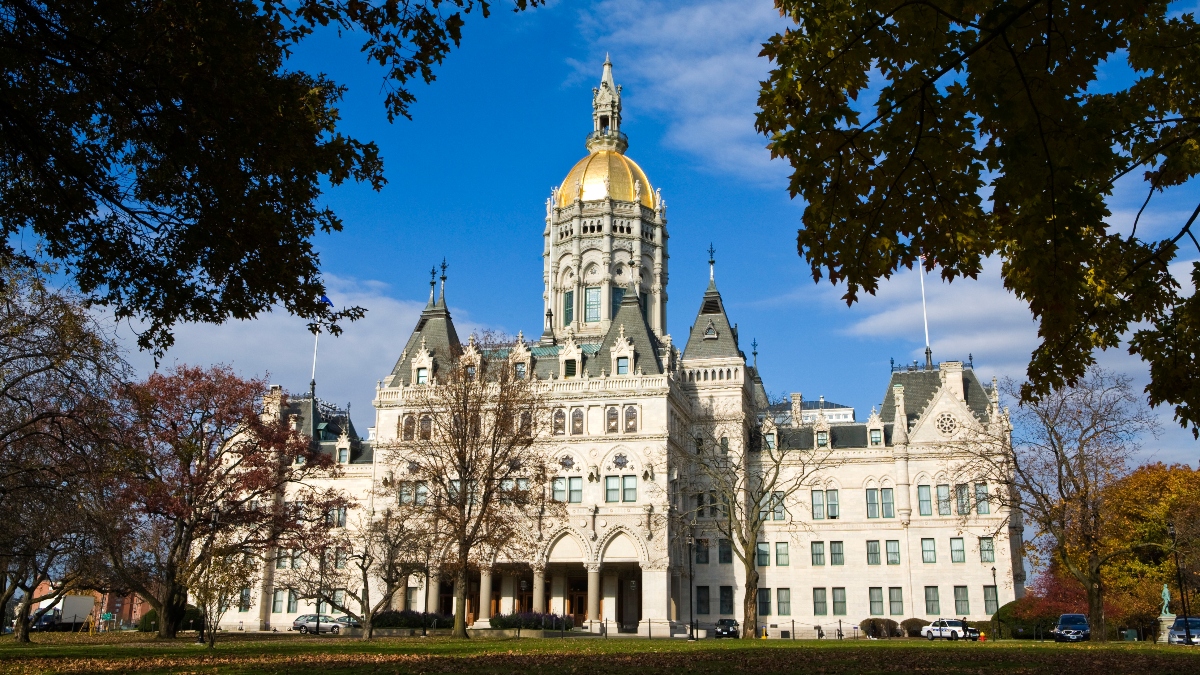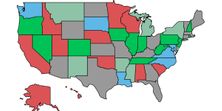Answering Connecticut Sports Betting Questions for Possible 2021 Legalization
Rolf Schulten/ullstein bild via Getty Images. Pictured: Connecticut State Capitol.
Legal sports betting in Connecticut looks like it could finally come to fruition next year, with state Rep. Sean Scanlon telling the Hartford Courant that legal wagering “will be legalized in 2021.”
Recent developments between elected officials and the state’s gaming stakeholders are laying the foundation for Scanlon’s prediction, though much remains uncertain. After several years seeming like a safe bet to approve sports betting legislation, Connecticut enters 2021 among a dwindling number of states without a legal wagering option.
Here’s what to expect when (or if) Connecticut approves sports betting.
What is the Background for Connecticut Gaming?
In the early 1990’s, the state’s Mohegan Tribe opened the Mohegan Sun and the Mashantucket Pequot Tribe opened Foxwoods Resort Casino on their respective sovereign tribal lands, becoming two of the world’s largest gaming complexes and major catalysts for both tribal and commercial gaming expansion in the region and across the United States.
As part of a deal between the tribes and the Connecticut government, the Mohegans and Mashantucket Pequots agreed to give 25% of their slot revenues to the state government in exchange for the exclusive rights to offer casino games in the state. By 2007, the two casinos took in more than $1.5 billion in slot revenues alone, which generated roughly $430 million in state taxes.
The Great Recession and increasing regional competition have kept the two casinos from reaching that record high set 13 years ago. The casinos are still major revenue generators for the tribes and the state government, but dwindling revenues have hurt both groups, a situation exacerbated by the COVID-19 pandemic.
One idea to increase revenues was a joint casino on non-tribal land near the Massachusetts border. Designed as a way to compete with MGM Springfield, which opened in 2017 a few miles from the Connecticut state line, opponents feared it would open the state to lawsuits from other casino operators, namely MGM, which argued the project on commercial land was against state law.
Another option was online casino gaming and sports betting.
After the Supreme Court struck down the federal wagering ban in May 2018, then-Gov. Dannel Malloy and current Gov. Ned Lamont have tried to work out a deal that would amend the existing compact to permit new gaming options. The government has sought a way to create a competitive marketplace for these gaming types, but the tribes have argued the earlier compact gives them exclusive rights to internet games and sportsbooks. Permitting any other iCasino operator or sportsbook in the state would force them to suspend slot revenue payments, the tribes said.
These complex negotiations have effectively stalled sports betting for three years despite widespread support for legal wagering among the tribes and elected officials, a stalemate that seemed unbreakable until this month.
Why Does Sports Betting Now Seem Possible?
Two major December developments have reignited hopes for legal Connecticut sports betting and possibly online casino gaming.
First, the tribes rescinded plans for the proposed joint casino. Long opposed by Lamont, this removes one obstacle between Native American groups and the governor.
It also reportedly opened Lamont up to a de facto sports betting duopoly for the tribes. Lamont had wanted a competitive marketplace, which is also favored by industry stakeholders, but he is now reportedly more open to giving the two tribes exclusive rights.
The other is the Mashantucket Pequot’s recently announced sports betting deal with DraftKings. Though gaming entities and sportsbook operators frequently arrange preemptive deals before they’re even legally allowed to take bets, this recent agreement shows DraftKings and bullish sports betting will begin in Connecticut.
DraftKings' entrance to the market is especially important.
The Boston-based company has shown it will do anything it can to be a leader in its home region, including dramatically outbidding all other operators for monopoly control of New Hampshire online sports betting. With DraftKings on board with one of the two tribes that will shape (and likely control) Connecticut sports betting, the future market has a powerful entrant that could go a long way into making legal wagering a reality.
Additionally, DraftKings has also expanded its iCasino offerings in the handful of states where it's legal, and it seems like a safe bet the company will push for the same option in Connecticut. Lamont has also reportedly warmed to the idea of statewide iGaming, in part because of reduced in-person visits (and, by extension, reduced revenues) to the two casinos during the COVID-19 pandemic.
What Would Connecticut Sports Betting Look Like?
Obviously, it's too early to tell what legal sports betting would look like in Connecticut, but the current trajectory seems to indicate bettors could access two legal sportsbooks.
One would be DraftKings. The other would be through the Mohegan Tribe, which already has a deal with sports betting service provider Kambi. One of the world’s largest sports betting companies, Kambi already has deals with the parent operators of 888, Unibet and BetRivers, among others. It’s possible one of those companies could earn the online license, or skin, to operate in that state.
Though the two-skin approach would disappoint other operators now shut out from the market, it would largely mirror most of the region’s other moves. Like New Hampshire and DraftKings, Rhode Island only offers one online sportsbook (William Hill). Massachusetts and New York are also considering markets that would allow brick-and-mortar casinos one online skin apiece.
When Could Sports Betting Begin?
In a best-case scenario, sometime in 2021. However, a best-case scenario is no guarantee.
With the tribes and Lamont now seemingly on firmer ground, it could be relatively straightforward to work with the legislature and the casino operators to create a framework that allows retail and likely mobile betting to begin as early as next year.
That could be easier said than done after similar negotiations failed in 2018, 2019 and, so far, in 2020. Though the tribes have extensive rights to Connecticut gaming, the state also has a government-run lottery and off-track betting parlors, both of which could conceivably want sports betting, as well, which could in turn jeopardize negotiations.
However, the state’s most important stakeholders are publicly more bullish than ever.
Much has to be determined when lawmakers return to the statehouse next month for the upcoming legislative session, but leaders have indicated it will be a priority. Scanlon, who will help shape any sports betting legislation as co-chair of the Finance, Revenue and Bonding Committee, told the Hartford Courant it was one of his biggest priorities and that it would be legalized in 2021.
Nothing is final yet, but Scanlon’s positive comments, the seeming breakthrough between the governor and the tribes and DraftKings’ commitment to the market are all among the strongest signs yet legal sports betting could be coming to Connecticut as early as next year.
How would you rate this article?


